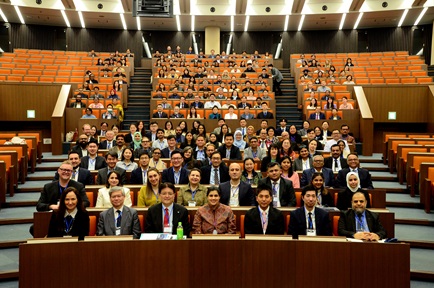Why strangers can expect more help from people in mixed neighbourhoods
When people from diverse racial groups live together in the same neighbourhood, each individual might be constantly reminded of their own group membership, and of the differences between their own group and other groups living around them.
By Krishna Savani
09072da7-9c9c-49d9-a4cf-87b76ebb0db3.jpg?Status=Master&sfvrsn=f20332e8_5)
When people from diverse racial groups live together in the same neighbourhood, each individual might be constantly reminded of their own group membership, and of the differences between their own group and other groups living around them.
Many prominent social scientists, such as Professor Robert Putnam at Harvard University, have claimed that people in more diverse neighbourhoods are less likely to trust one another, and that this lack of trust can have massive negative effects on neighbourhood cohesion and sense of community.
Although most research on neighbourhood diversity has focused on negative consequences, my team asked if there might be some positive effects of living in more diverse neighbourhoods.
(The research project cited in what follows is co-authored with Jared Nai, Assistant Professor of Organisational Behaviour and Human Resources, Singapore Management University; Jayanth Narayanan, Associate Professor of Management and Organisation, National University of Singapore; and Ivan Hernandez, Instructor of Psychology, DePaul University.)
Specifically, we asked whether people living in more ethnically diverse neighbourhoods have a more inclusive sense of self-identity that goes beyond their own racial group. If so, then such an expanded sense of identity may lead people in more diverse neighbourhoods to be more prosocial than people who live in more ethnically homogeneous areas. This prosociality can be expressed in many ways, including one's concern for others' well-being, one's empathy towards the other, and one's desire to help others.
In the first study, we examined people's tweets on Twitter for words that expressed prosocial concepts, such as "charity", "helpful", and "selfless". We found that people living in more racially diverse US cities were more likely to mention prosocial concepts in their everyday tweets.
In the second study, after the 2013 Boston Marathon bombings, The Boston Globe newspaper set up a website where individuals could offer to host stranded visitors in their homes. Using a sample of 4,502 help offers posted on the website, we found that people in more racially diverse neighbourhoods were more likely to spontaneously offer help to complete strangers who were stranded by the bombing.
'WORLD CITIZENS'
In the third study, using data from a combination of surveys, such as the World Giving Index and the World Bank database, we found that people living in more ethnically diverse countries were more likely to say that they helped a complete stranger in the past month.
Thus, the relationship between diversity and helping generalises to the national level. These three studies provided converging evidence for the idea that people in more diverse neighbourhoods are more helpful.
Finally, we asked why this is the case. We surveyed people living in a range of neighbourhoods varying in diversity and asked questions like, "How much do you identify with all humans everywhere?"
We found that people living in more racially diverse neighbourhoods were more likely to say that they identify with all of humanity, that they identify as "world citizens" rather than as members of a specific racial or ethnic group. This broader sense of identity explained why people in more diverse neighbourhoods were more likely to have helped a stranger in the past month.
Our research has implications for many aspects of national development and unity. Governments should try to avoid people from different races segregating into separate enclaves. In Singapore, the Ethnic Integration Policy, implemented in 1989, establishes ethnic quotas for Housing Board neighbourhoods and blocks. In practical terms, this means that every day, members of different races have the opportunity to interact with one another, such as at corridors, lifts, buses, shops and hawker centres. Our research suggests that everything else being equal, the racial integration within Singapore likely made Singaporeans more prosocial and helpful.
Although Singapore's Ethnic Integration Policy has helped ensure racially diverse neighbourhoods, similarly diverse schools and workplaces would also be beneficial.
For example, currently, students learning Malay are put in different classes from students learning Tamil or Mandarin, which may limit the amount of interaction between students of different ethnicities. Further, some schools also have a low percentage of students of certain ethnicities. If such schools and workplaces are made more diverse, it is likely to help increase the country's prosociality.
Anti-discrimination employment laws, and diversity of the workplace, also should be scrupulously maintained. This is important not only because of principles of fairness but also because the workplace, where adults spend much of their day, provides a multitude of opportunities for cross-race interactions. As colleagues of different ethnicities work towards a common corporate goal, or even clash and resolve issues professionally, vital bonds and trust are built.
A good multi-ethnic mix of the population is not good just for peace and harmony. It is also good for the economy and society. Past research has found that people who have lived or worked abroad for a longer period tend to be more creative because they have engaged with a greater diversity of ideas. Similarly, bicultural individuals who have significant exposure to two or more cultures are also more creative than monocultural individuals.
The current research suggests that compared with many other nations, Singapore's unique Ethnic Integration Policy had numerous unintended positive effects for the country. Nevertheless, there are probably many opportunities for further racial integration, which would likely have positive effects on both Singaporeans' prosociality, their creativity and their analytical thinking.
Krishna Savani is Associate Professor of Strategy, Management and Organisation, and Director of the Cultural Science Institute at Nanyang Business School, Nanyang Technological University.







